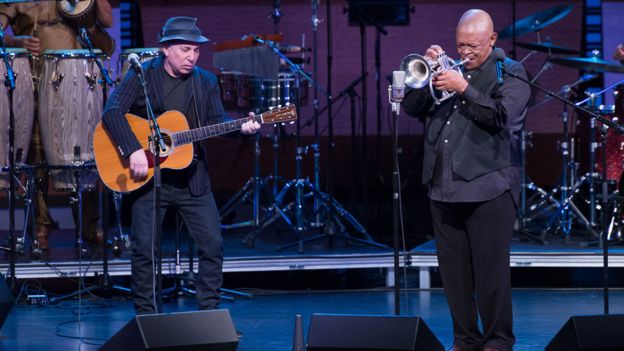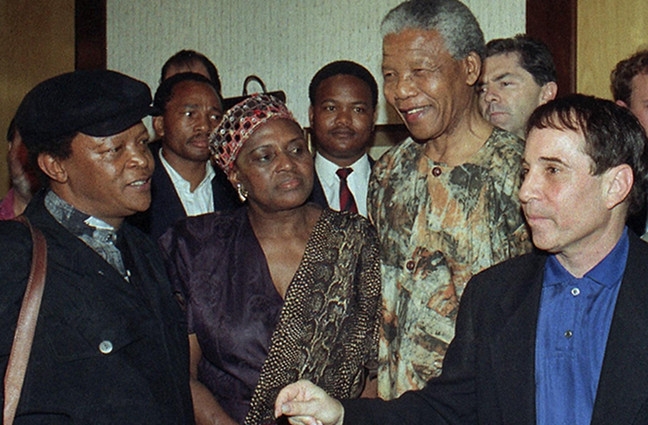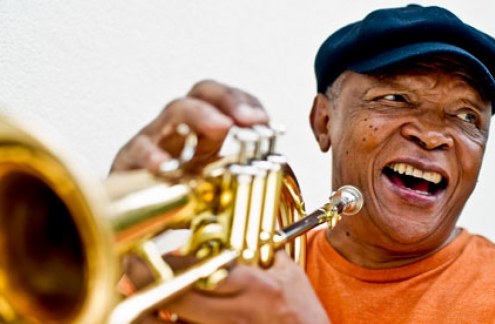South African Jazz legend, Hugh Masekela will not only be remembered for his massive contribution to the music industry worldwide, but for his role in the Anti-apartheid movement.
Born on the 4th of April, 1939 in the Kwa-Guqa township, Witbank, South Africa, he began singing and playing the piano as a child. However, after seeing the film Young Man with a Horn when he was 14, Masekela took up playing the trumpet. He received his first trumpet from Archbishop Trevor Huddleston, an anti-apartheid chaplain at St Peter's Secondary School.
Huddleston asked the leader of the then Johannesburg "Native" Municipal Brass Band, Uncle Sauda, to teach Masekela the rudiments of trumpet playing. Masekela quickly mastered the instrument. Soon, some of his schoolmates also became interested in playing instruments, leading to the formation of the Huddleston Jazz Band, South Africa's first youth orchestra. By 1956, after leading other ensembles, Masekela joined Alfred Herbert's African Jazz Revue.

From 1954, Masekela played music that closely reflected the agony, conflict, and exploitation South Africa faced during the 1950s and 1960s.This inspired and influenced him to make music and also spread political change. He was an artist who in his music vividly portrayed the struggles and sorrows, as well as the joys and passions of his country. His music protested about apartheid, slavery, government; the hardships individuals were living. Masekela reached a large population that also felt oppressed due to the country's situation.
Hugh Masekela's music career
At the end of 1959, Dollar Brand, Kippie Moeketsi, Makhaya Ntshoko, Johnny Gertze and Hugh formed the Jazz Epistles, the first African jazz group to record an LP and perform to record-breaking audiences in Johannesburg and Cape Town through late 1959 to early 1960.
Following 21 March 1960 Sharpeville massacre—where 69 protesting Africans were shot dead in Sharpeville, and the South African government banned gatherings of ten or more people—and the increased brutality of the Apartheid state, Masekela left the country.

He was helped by Trevor Huddleston and international friends such as Yehudi Menuhin and John Dankworth, who got him admitted into London's Guildhall School of Music.
During that period, Masekela visited the United States, where he was befriended by Harry Belafonte. He attended Manhattan School of Music in New York, where he studied classical trumpet from 1960 to 1964. In 1964, Miriam Makeba and Masekela were married, divorcing two years later.
Bra Hugh's lifetime achievements
Internationally renowned Masekela was involved in many projects worldwide in the music, film, literature and theatre industries.
The former husband of the late Miriam Makeba, was presented with the highest order in South Africa, The Order of Ikhamanga.
In 2011 he received a Lifetime Achievement award at the WOMEX World Music Expo in Copenhagen. Bra Hugh was also honoured with a ‘Hugh Masekela Day’ in March 2011.

He lived in exile during the apartheid years and his 1987 hit Bring Him Back Home subsequently became the theme tune for Nelson Mandela’s world tour after he was released from prison.
During his illustrious career, he shared the stage with legends such as Harry Belafonte, Jimi Hendrix, Janis Joplin, The Dave Matthews Band and Paul Simon, to name a few.
He broke new ground in the United States with pop jazz hits like Up, Up and Away (1967) and the number-one smash hit Grazing in the Grass (1968), which sold four million copies. During his career, he was nominated for seven Grammys and won two.
Masekela was known as one of the most hard-working entertainers in South Africa. He toured constantly and kept his finger on the pulse of South Africa music.
The death of the legend Hugh MasekelaÂ
"A baobob tree has fallen," Nathi Mthethwa, South Africa's minister for arts and culture, wrote on Twitter. "The nation has lost a one of a kind musician . We can safely say Bra Hugh was one of the great architects of Afro-Jazz and he uplifted the soul of our nation through his timeless music."
Hugh Masekela died at age 78 after a protracted and courageous battle with prostrate cancer, surrounded by his family in Johannesburg, South Africa.
South African President Jacob Zuma expressed his condolences, saying Masekela "kept the torch of freedom alive globally, fighting apartheid through his music and mobilizing international support for the struggle for liberation and raising awareness of the evils of apartheid ... His contribution to the struggle for liberation will never be forgotten."





